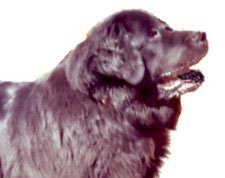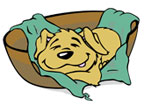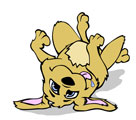Newfoundland Dog Breed
Dog Group: Working Group
Class: Working
Description

The Newfoundland is a very large, strong and powerful dog with a rather regal, proud look about it. It has medium-sized pendant ears, and small dark eyes that lend it a deep and philosophical look. The Newfoundland has a long, wavy outer coat with a protective, oily undercoat. The colors of the coat include black, gray, brown or black with white markings. This breed also has webbed feet designed for swimming. The Newfoundland has a handsome pace and a muscular physique, giving him a proud and determined appearance.
Temperament
The Newfoundland has an excellent temperament, and is loyal, loving, brave and devoted. This breed is very attached to his owner and very protective, but will resort to warning off danger rather than launching in to an attack. The Newfoundland is excellent with children and good with other household pets. The temperament of the Newfoundland has been described as sweet, calm and gentle, making them ideal family pets. These dogs love to play and swim, and adore company and attention. They can prove a little difficult to train as they do have a very independent streak, but they do respond well to tone of voice so shouting is unnecessary during training, and in fact a calmer approach is recommended.
Height and Weight
The Newfoundland is a large dog, and the males can expect to reach around 27-29 inches in height, with females averaging around 25-27 inches. The weight of a male Newfoundland should reach around 130-150 pounds, with females lagging only slightly behind at 100-120 pounds.
Common Health and Behavioral Problems
As with other larger breeds, hip dysplasia can cause swelling and mobility problems in the breed. They are also prone to sub aortic stenosis, a heart condition, which means that their diet and weight should be carefully monitored to decrease the risks of this heart condition occurring.
Ideal Living Conditions
These dogs are sensitive to heat and are more suited to cooler temperatures, so you should bear this in mind when you decide to get a Newfoundland. These are big dogs and will always fare better with at least a small yard or garden in which to play and exercise. However, they will adapt to apartment life providing plenty of exercise is available.
Exercise Requirements
The Newfoundland not only loves to swim, but is designed to swim, so this will be a favorite form of exercise for him. Other than swimming, the Newfoundland may try and get out of activity, but should be encouraged to take regular, moderate exercise to improve health and fitness.
Diet and Nutrition
Puppy Newfoundland's need a very nutritious diet, as this helps to ensure the correct formation of bones and joints. An adult Newfoundland can be fed a normal diet, but this should be carefully monitored in terms of potions as excess weight gain to add to the risk of heart disease. Your Newfoundland should always have access to fresh, clean water.
Life Expectancy
The Newfoundland does not have a very long life expectancy compared to some other breeds, and the average lifespan of a healthy Newfoundland is around ten years or less.
Grooming Requirements
You should use a hard brush on the coat of the Newfoundland at least several times each week, and this can be complemented with occasional dry shampooing when required. Only bathe when really necessary, as this may strip the coat and skin of essential oils.
Origin
The Newfoundland originates from Canada, unsurprisingly from Newfoundland Island. They are reported to be descendants of the Tibetan Mastiff, which was brought to Newfoundland by French and English fishermen. The original Newfoundlands were bred to hunt and guard, but they soon became popular with fishermen who found them very useful in and around water. The webbed feet and oily skin of the Newfoundland meant that these dogs could stay in water for long periods of time, and were expert swimmers. In fact, the Newfoundland has been known to save many a life by jumping in to waters and rescuing drowning victims. The American Kennel Club first registered the breed in 1886.
 |
 |
Secrets to Dog Training: Consultation
Secrets to Dog Training offers a free consultation with every order! Here is one submitted by Daniel about her Newfoundland puppy Lela who is having trouble with potty training and is just starting to nip ...
Daniel's Consultation
Hi Daniel,
So far your book has been very helpful and it's only been a week!
Let me describe my concern as I am not sure it's even a problem just yet and maybe it's too early.
I have a Newfoundland. Her name is Lela and she is 12 weeks old. In the beginning her behavior was very docile, I taught her to sit quite easily and she understands the use of the hand command for sit not just verbal. She'll do it on cue with almost no hesitation. Currently there are two things going on. 1) She is nipping and biting a great deal and 2.) potty training is a bit of a challenge. Believe me I have been instilling your training techniques.
She seems impatient. Partially I am sure due to boredom, even though when we take her on walks, I can't get her to walk more than a block without a struggle. I know she understands, I can see it in her eyes. It's almost like she is testing me and being defiant on purpose. I have heard that Newfi's will look at you like they know what you are saying and they simply choose that they can't be bothered. I practice the "Alpha" techniques and at times it works, she starts to crave the attention and behaves a tad better.
On to the nipping, she bites and chews on everything but especially hands. Again, I'll distract her, give her a chew toy and she'll turn away from it (at times) and go for my hands. Also, at times when I walk away, i.e., get off the couch she'll charge up behind me and bite at the back of my knees and legs. I can only guess that she doesn't want to be left alone. Believe me this puppy is more adorable than I ever imagined and she gets attention and isn't ignored. Tying this behavior into playing fetch...... I'll toss the ball, she'll run up to it, then "stalk" it and pounce on it, she'll scoop it up and bring it back towards me and not always to me.
Potty training isn't so bad as I know when she has to go outside. However I am having a hard time getting her to communicate to me when she has to go, even though I associate her giving me her paw when she has to go potty. She hates the kennel and prefers to be "kenneled" in the bathroom on the cold tile floor. In fact if you ask her kennel or bathroom, she'll bark like mad when you say bathroom. It's like she understands our language at times. I think the problem there is she gets to warm and likes to sleep on the floor next to or behind the toilet where it's wet/cold.
Ok, I hope this makes sense and maybe you could somehow sum it up as it seems her behavioral issues are somewhat intertwined. It would be helpful if you could outline expectations for her age and where she should be in her development. Maybe I am expecting too much?
Thank you for your time,
Josie
Secrets to Dog Training Reply:
Hi Josie,
Thanks for your email.
It sounds to me that you are doing well with your training. The problems you are having a fairly normal at your puppy's age, although the hand biting should be corrected as soon as possible as she is a big dog. Keep up the training tips that are in the "Secrets to becoming the Alpha Dog" this is something you have to enforce for the life of the dog. I am not sure what you mean by "struggling" with her on the leash, however, I assume you mean she is pulling.
If this is the case I recommend you use treats to make her heel whenever she walks at your side, say "Heel" and praise her with a treat as well. When she starts to pull, give the collar (lead) a few tugs and stop walking. Make her come and stand by your side slightly to the back of you so she knows who’s boss. Only walk forwards after about twenty seconds and command her to "Heel" as you walk off as soon as she goes ahead, bring her back.....be consistent and she will get the idea. Remember large breed dogs can only have very light exercise while they are growing, otherwise it will put to much stress on her developing bones and joints.
When she starts to bite at your hands you need to reprimand her strongly. I personally believe, that if you can master "the Growl" (!) there is nothing that works better, this is after all what an alpha dog would do to a subordinate dog to let them know that they are out of line. The alpha dog would turn, square on, eyes on eyes, and bare his teeth and growl aggressively. This is basically what you have to do. Sit down with your puppy and as soon as she goes to bite you stand up as quickly as you can while growling aggressively at her. Say "AAAHH!" -this seems to make a sharper more realistic growl sound then "No!" say it loud and deep as you can (this can give you a sore throat after a while but it works well). Otherwise if you are not up to growling in this way then try shaking a can of pebbles while growling the best you can.
Then what you should do is sit down to play with her again and hold out your hand, deliberately dear her to bite you again and if she just licks you or stares at you warily, then praise her. If she bite you again, do the growl again, but this time give her 'time out' in a place that would be safe to do so, preferably not a place she sleeps such as the bathroom of the crate, these places are suppose to be positive for her.
As long as you understand when she needs to go potty, then there should be no problem with toilet training. At twelve weeks your puppy should be well trained and you should be able to recognize her routines.
I hope this is helpful for you Josie. Good luck!
Kind regards,
Daniel Stevens
Secrets to Dog Training Team
http://www.kingdomofpets.com/dogobediencetraining
More Resources
 |
 |
Want to find out about more dog breeds? Search here or go to our Dog Breed index.
Got Dog Obedience Training or Problem Behavior Issues?
Is your dog trying your patience on a daily basis? Are you constantly faced with a dog that displays one of the following issues? To find the solution to your problem click on it.. you'll discover the answers to it and other common dog problems you may be facing.
This is the most comprehensive book on dog training and behavior problems around. Best of all... You can download this book to your computer and be reading and using the professionals training techniques in minutes.
About The Author
Daniel Stevens is the renowned dog trainer and author of Secrets to Dog Training: STOP Dog Behavior Problems!, one of the leading dog training guides on the market today selling over 25,743 copies (and counting). He currently heads the Kingdom of Pets dog training team.

